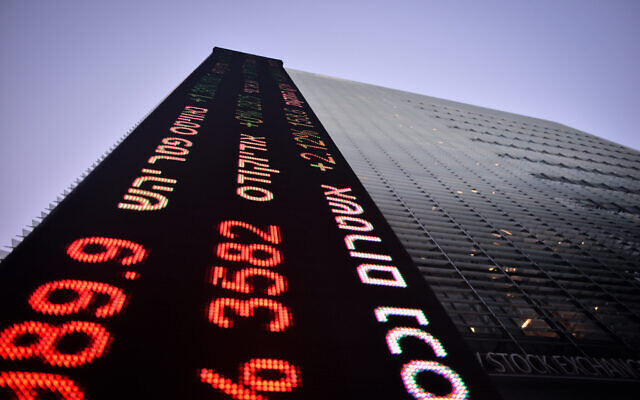Shekel returns to gains amid cautious market optimism over judicial compromise bid
Recent comments by government representatives and selection process of judicial panel bring some confidence back to Israeli markets, erasing most of the losses of the past 2 weeks
Sharon Wrobel is a tech reporter for The Times of Israel.
The shekel appreciated against the US dollar for a second day on Wednesday amid signs that the contentious judicial overhaul would not be advanced as planned and amid cautious optimism that a compromise could be reached.
The local currency appreciated more than 1.8% to 3.64 against the greenback in intraday trading after hitting a four-year low last week. Tel Aviv Stock Exchange’s benchmark TA-125 index gained 2% and the TA-35 index of blue-chip companies rose 1.8% at the close in Tel Aviv.
The shekel regained most of its losses of the past two weeks which were driven by renewed political uncertainty around the Israeli government’s proposed judicial overhaul.
“The main factor influencing the shekel since the start of the year are developments around the proposed judicial overhaul, and that is what we are also seeing over the past few days,” Rafi Gozlan, chief economist at IBI investment house, told The Times of Israel. “If after the state budget passage last month, we saw big shekel declines as the market grew wary about renewed efforts to advance the judicial changes following comments by the prime minister and coalition members, the developments in recent days, including comments from the director general of the Prime Minister’s Office and the likely appointment of an opposition representative on the judicial selection panel have brought some confidence back to the market.”
“The appreciation of the shekel over the past few days is not necessarily a game changer but it shows that the market’s recent concerns over a revival of the original plans to make contentious changes to the country’s judicial system have moderated for now,” Gozlan added.
Gozlan referred to the comments made by Yossi Shelley, director general of the Prime Minister’s Office, in a radio interview on Tuesday, where he suggested that the government’s judicial overhaul plan was as good as dead. Shelley later that day issued a statement saying that he did not mean to imply that “we need to withdraw from the legal reform, which we are committed to,” but rather to stress that the government is also involved in many other issues at the same time.

Next week, the Knesset is scheduled to vote to appoint two lawmakers to the nine-member Judicial Selection Committee. The makeup of the judicial selection panel is central to the coalition’s ongoing efforts to increase political control over the judiciary. A key bill in the overhaul plan — now frozen just before finalization — would reshape the committee and hand the government an automatic majority, giving it the power to determine most judicial appointments.
Proponents say this is needed to balance the system’s activist, liberal slant, while critics warn the move will politicize courts and cause grievous harm to Israeli democracy. Negotiators from the coalition and opposition working towards compromise on the judicial shakeup cite the matter as one of their biggest hurdles.
The Organisation for Economic Cooperation and Development (OECD) warned on Wednesday that Israel’s economy is set to expand at a more moderate pace this year, citing the risk of continued political tensions around the government’s planned judicial overhaul and uncertainty about the global economy.
The tensions could “increase risk perceptions, lead to tighter financial conditions, and weigh on business sentiment and investment,” the OECD said.
The OECD suggested that the impact is already being felt as the “shekel has depreciated in the first five months of the year and the stock market has markedly underperformed global indices.”
In the past two weeks of May, the TA-35 and the TA-90 indices dropped by 5.5% on average, while the US Dow Jones Index declined 1.5% and European markets slipped 2.5%, according to Tel Aviv Stock Exchange data. During the same period, the TA-Insurance, and the TA-Banks-5 indices, both decreased by 8.5% on average. Negative sentiment was fuelled by the government approval of the state budget for the years 2023 to 2024; a wave of price increases in the economy, mainly food products; and renewed uncertainty regarding the advancement of the legal reform.
During the full month of May, the shekel weakened against the greenback by about 1.9%, after weakening about 3.5% from January to April. A weaker shekel makes imported goods more expensive which in turn means continued price increases in the economy, which are weighing on the cost of living and are fueling inflationary pressures.
The Bank of Israel last month hiked its benchmark interest rate for a 10th consecutive time, lifting borrowing costs to 4.75%, the highest level since 2006 as it struggles to rein in inflation, which has been hovering above 5% — far above the government’s target range of 1% to 3%.
Central bank governor Amir Yaron said last week that since the beginning of the year as the newly formed government started to advance the proposed changes to Israel’s judicial system, the “excess” devaluation of the shekel of 10% versus the dollar has had a material impact on inflation, and hinted at further interest rate hikes should the local currency continue to weaken in coming weeks.
“The shekel has turned into a barometer of market sentiment centered around the judicial overhaul,” said Gozlan. “If the market believes that the recent developments around the reform are a bluff and not genuine steps leading to a compromise, Israel’s risk premium will rise again, meaning that we could see the shekel slide again.”
Times of Israel staff contributed to this report.










